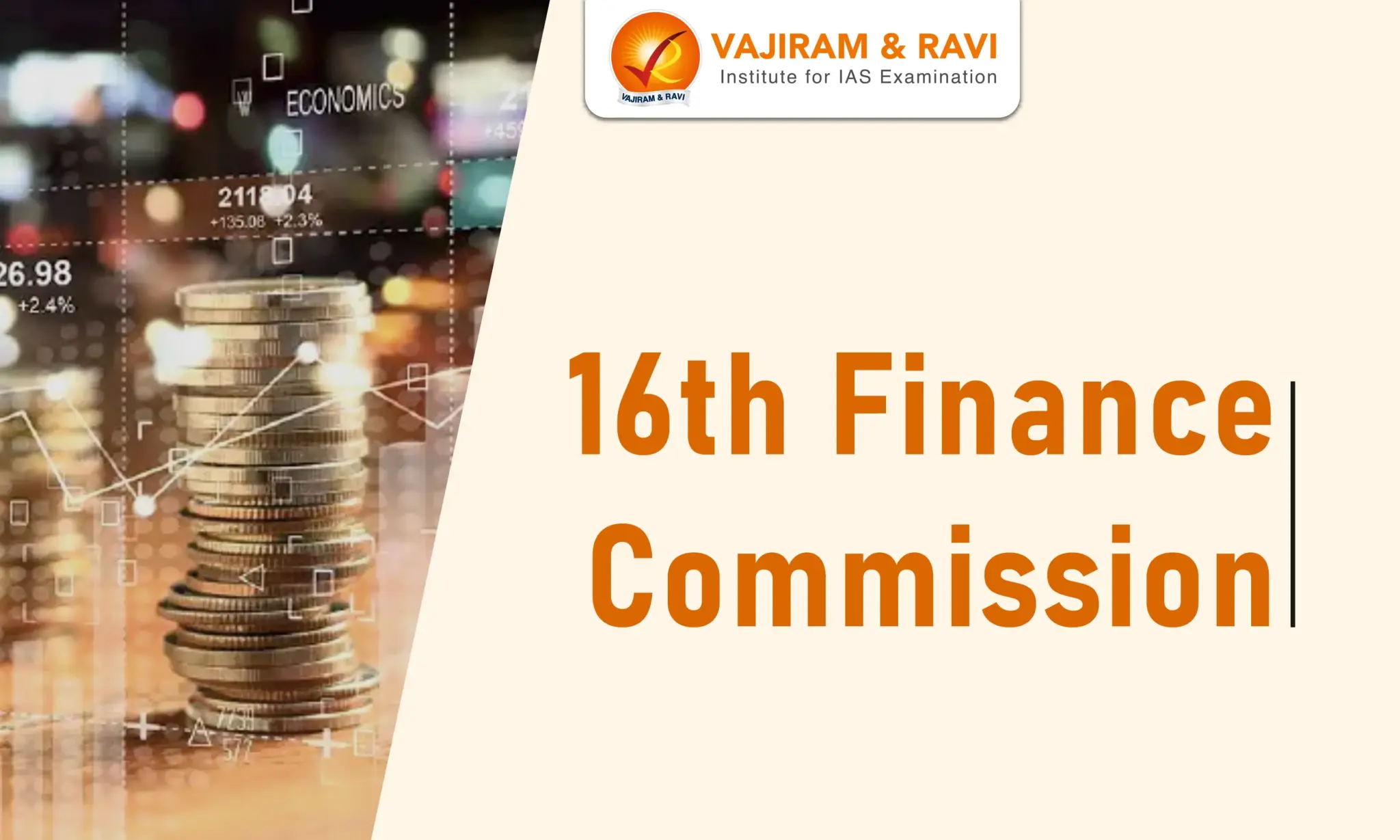The 16th Finance Commission, commencing April 1, 2026, is chaired by Dr Arvind Panagariya and addresses vital responsibilities such as equitable resource distribution, grants-in-aid principles, and strengthening local governance. It also focuses on disaster management financing and urbanization challenges.
The Finance Commission, established under Article 280 of the Indian Constitution, is a constitutional body that recommends the distribution of tax revenues between the central and state governments every five years. The Commission plays a crucial role in maintaining fiscal federalism, ensuring effective governance, and addressing economic disparities among states.
Finance Commission
The Finance Commission is a constitutional body in India established under Article 280 of the Constitution, tasked with maintaining fiscal federalism by recommending the distribution of tax revenues between the central and state governments. Constituted every five years by the President, it comprises a Chairman and four members with expertise in finance, economics, or public administration.
- It recommends the sharing of net tax proceeds (e.g., income tax, GST) between the Union and states, grants-in-aid for revenue-deficient states, and measures to enhance local body resources for grassroots governance.
- It also advises on fiscal discipline, public expenditure, and other financial matters referred by the President.
16th Finance Commission
The 16th Finance Commission of India, established under Article 280 of the Constitution, is mandated to recommend the distribution of tax revenues between the central and state governments for five years commencing April 1, 2026.
- The Commission is currently chaired by Dr Arvind Panagariya, and its members include Ajay Narayan Jha, Annie George Mathew, Manoj Panda, and Soumya Kanti Ghosh (part-time), with Ritvik Ranjan Pandey serving as Secretary.
Terms of Reference and Key Responsibilities
The terms of reference for the 16th Finance Commission encompass several key responsibilities that guide its operations. The Finance Commission advises on tax revenue sharing, grants-in-aid principles, resource support for local bodies and disaster management funding to strengthen state and local governance.
- Tax distribution: The commission will recommend how to distribute the net proceeds of taxes between the Union and the states.
- Grants-in-aid: The commission will recommend principles for grants-in-aid of state revenues.
- Consolidated Fund: The commission will recommend measures to increase the Consolidated Fund of a state.
- Disaster management: The commission will review the current arrangements for financing disaster management initiatives.
16th Finance Commission Challenges
The 16th Finance Commission of India is tasked with addressing several significant challenges that impact fiscal federalism and resource allocation among the Union and State governments. The following are some of the key challenges identified:
- Preserving Tax Devolution: Ensuring the state’s 41% share of central taxes remains intact is crucial to prevent reduced state revenues and maintain their ability to fund essential services amidst rising central liabilities.
- Urban Fiscal Support: Rapid urbanization demands over ₹840 billion for infrastructure over the next decade, necessitating increased intergovernmental transfers to sustain urban finances.
- Balancing Regional Disparities: Significant income disparities among states require tailored tax and grant allocations to provide equitable support to less developed regions.
- Reforming Centrally Sponsored Schemes (CSS): The Commission should consider limiting CSS to enhance state autonomy, ensuring these schemes support national priorities without restricting state governance.
- Disaster Financing Improvements: Given frequent natural disasters, the Commission may strengthen disaster funding under the Disaster Management Act, 2005 to improve response and resilience.
- Debt and Fiscal Health: Rising state debts, especially post-COVID, demand Commission recommendations that consider states’ fiscal stability while supporting critical infrastructure needs.
- Post-COVID Economic Adjustments: To support recovery, the Commission should tailor allocations to account for states’ reduced revenues and increased healthcare costs post-pandemic.
- Mitigating Freebie Culture: Addressing excessive subsidies, the Commission may introduce measures that balance welfare initiatives with long-term fiscal health, possibly through incentives or spending guidelines.
Last updated on June, 2025
→ UPSC Notification 2025 was released on 22nd January 2025.
→ UPSC Prelims Result 2025 will be out soon for the CSE held on 25 May 2025.
→ UPSC Prelims Question Paper 2025 and Unofficial Prelims Answer Key 2025 are available now.
→ UPSC Calendar 2026 is released on 15th May, 2025.
→ The UPSC Vacancy 2025 were released 1129, out of which 979 were for UPSC CSE and remaining 150 are for UPSC IFoS.
→ UPSC Mains 2025 will be conducted on 22nd August 2025.
→ UPSC Prelims 2026 will be conducted on 24th May, 2026 & UPSC Mains 2026 will be conducted on 21st August 2026.
→ The UPSC Selection Process is of 3 stages-Prelims, Mains and Interview.
→ UPSC Result 2024 is released with latest UPSC Marksheet 2024. Check Now!
→ UPSC Toppers List 2024 is released now. Shakti Dubey is UPSC AIR 1 2024 Topper.
→ Also check Best IAS Coaching in Delhi
16th Finance Commission FAQs
Q1. Who is the Chairman of the 16th Finance Commission?+
Q2. What is the agenda of the 16th Finance Commission?+
Q3. What is the tenure of 16th Finance Commission?+
Q4. What is Article 280 of the Constitution of India?+
Q5. What is the vertical devolution of the 16th Finance Commission?+
Tags: 16th finance commission quest




















